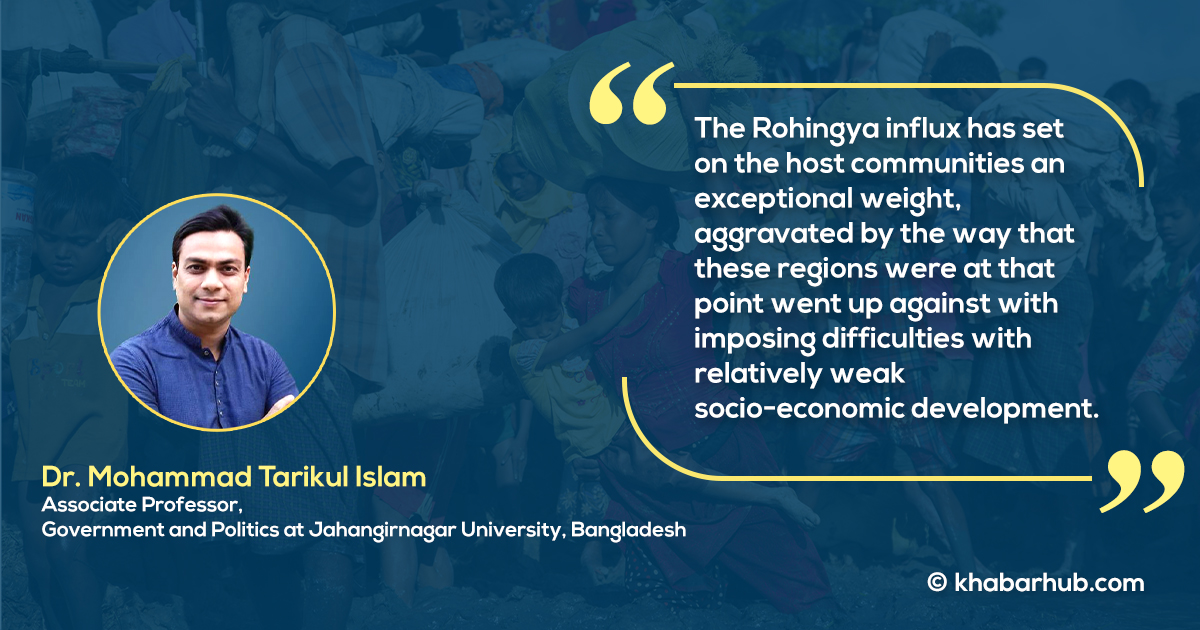Bangladesh is now hosting around one million Rohingya refugees and this highlights a serious concern of human security.
Myanmar government has been very reluctant to take back its nationals, the Rohingya, despite the robust diplomatic endeavors of the Bangladesh government regarding repatriation.
Providing basic provisions such as food, shelter, and healthcare have been the utmost priorities at the moment and also for the rest of the period until the return of Rohingya refugees from Bangladesh to Myanmar. Rohingya refugees are seriously at risk of human trafficking.
Employment opportunities in the evolving challenges in the makeshifts where refugees are living. Even, there is the likelihood of increasing happening of such incidences and aggravating the local social and cultural harmony among the local citizens and the Rohingya refugees.
The Rohingya influx has set on the host communities an exceptional weight, aggravated by the way that these regions were at that point went up against imposing difficulties with relatively weak socio-economic development.
Given their living space mostly located in Teknaf-Cox’s Bazar areas, the refugee earmarked areas are adjacent to the settlements of the local citizens. Once, many awkward incidences happened between them causing law and order situations.
Impacts have been particularly related to a fall in daily wages for laborers and extremely adverse impacts on public services and the environment.
Refugees are not legally entitled to work in Bangladesh. The inability to survive without employment leads many refugees, particularly men, to seek employment illegally.
They are exposed to serious risks in doing so including unfair/unsafe work conditions, harassment, exploitation and extortion.
While emergency support was quick to arrive, long-term continual support is essential, particularly given the uncertain length of stay of the Rohingya refugees.
While pressing for eventual repatriation, Bangladesh and the international community should move past short-term planning and work together to build safe housing, improve refugees’ educational and livelihood opportunities, and support refugee-hosting communities.
Apparently, Bangladesh has been untiring by putting pressure on the Myanmar government to take back its citizens by creating a safe and secure environment.
Prolonged stay is bringing about the pitiable human security condition of the Rohingya community. The Rohingya refugees who are downright marginalized are seriously at the risk of human trafficking.
It is evident that international human trafficking gangs are actively looking at this situation to mishandling the vulnerability of the Rohingya for abusing.
A high proportion of refugee men, some assisted by their adolescent sons, resort to informal work to supplement humanitarian assistance.
Mentioning the stubborn Rohingya crisis as a potential threat to human security, UN agencies working in Bangladesh have been in appeal to the international community for the adequate fund to provide them basic supplies for survival.
It is the experience of different countries which hosted refugees during many humanitarian crises that international supports lessen over time if the refugee crises continue.
In this kind of situation, the decisive economic affliction of humanitarian support to the refugees falls on the host country.
Given their living space mostly located in Teknaf-Cox’s Bazar areas, the refugee earmarked areas are adjacent to the settlements of the local citizens. Once, many awkward incidences happened between them causing law and order situations.
In the future, with the increasing number of refugees and sheltered close to the native citizens’ settlements there is the likelihood of increasing happening of such incidences and aggravating the local social and cultural harmony among the local citizens and the Rohingya refugees.
Given the terrible state of human security at the Rohingya refugee camps, Bangladesh is likely to face serious challenges with the influx of Rohingya refugees in the following areas:
- Pressure on employment; depression of daily wage and cost of living
- Loss of school years (for locals and Rohingya)
- Health issues among Rohingya and locals (mortality and morbidity, chronic malnutrition, respiratory illnesses, etc.)
- Deforestation; loss of biodiversity and ecosystem and natural calamities (landslides)
- Unethical activities (drug and human trafficking, prostitution, etc.)
What we have found in many cases, refugees are selling large quantities of certain in-kind assistance received as relief items. Rice, lentils and cooking oil are mentioned as being the most traded.
Their purchases of other products, on the other hand, push prices up. Rohingya purchase several items, including potatoes, fresh vegetables, meat, fish and firewood, thereby raising prices on those goods.
Conventionally, refugees are not legally entitled to work in Bangladesh. The inability to survive without employment leads many refugees, particularly men, to seek employment illegally.
A broad package of vocational training and self-reliance programs engaging all relevant actors including the Government is required if the long term self-sufficiency of the refugee population is to be achieved.
They are exposed to serious risks in doing so including unfair/unsafe work conditions, harassment, exploitation and extortion.
A high proportion of refugee men, some assisted by their adolescent sons, resort to informal work to supplement humanitarian assistance.
This includes work as unskilled laborers, fishermen, rickshaw pullers and salt and brick factory workers. Refugees working illegally are open to exploitation by local employers, to a great extent.
Their need for income, and insufficient means to earn it, has led many refugees to sell portions of their food rations what is mentioned above as well.
The host community is not welcoming them as well to work with them. Many local residents have become used to this trade and are not eager to see refugees afforded more income-generating possibilities for fear that this source of food from the humanitarian aid will be diminished.
Meanwhile, WFP has launched basic self-reliance programs in the camps, aimed at improving the status of vulnerable refugee children and families.
Food for Work initiatives has provided much-needed supplementary food in return for labor on social works. UNHCR’s interventions have been another example of protecting refugees against such harsh penalties but in the absence of lawful sources of income, refugees remain susceptible to the abuse by local businessman, camp personnel and local residents.
The UN at the same time must enforce the recommendation of the Annan Commission by imposing diplomatic pressure on Myanmar.
A broad package of vocational training and self-reliance programs engaging all relevant actors including the Government is required if the long term self-sufficiency of the refugee population is to be achieved.
Well, providing livelihood opportunities is crucial for their survival but then again the stubborn diplomatic endeavor of the government of Bangladesh must be taken forward without any pause in the action.
We urge upon the Government of Myanmar to take urgent action to address the root causes of the crisis which have persisted for decades so that people are no longer forced to flee and the refugees can eventually return home in safety and dignity.
The UN at the same time must enforce the recommendation of the Annan Commission by imposing diplomatic pressure on Myanmar.
In this regard, UN Security Council must bring the resolution to facilitate the investigation on violation of human rights and thus ensure international supervision for safe repatriation as well as initiate a visit to the Rohingya refugee camps by the Security Council again to force the government of Myanmar for setting up “safe zones” for people of all backgrounds in conflict-torn parts of Myanmar as proposed by the Prime Minister of Bangladesh Sheikh Hasina.
(Dr. Mohammad Tarikul Islam is an Associate Professor in Government and Politics at Jahangirnagar University in Bangladesh)









Comment